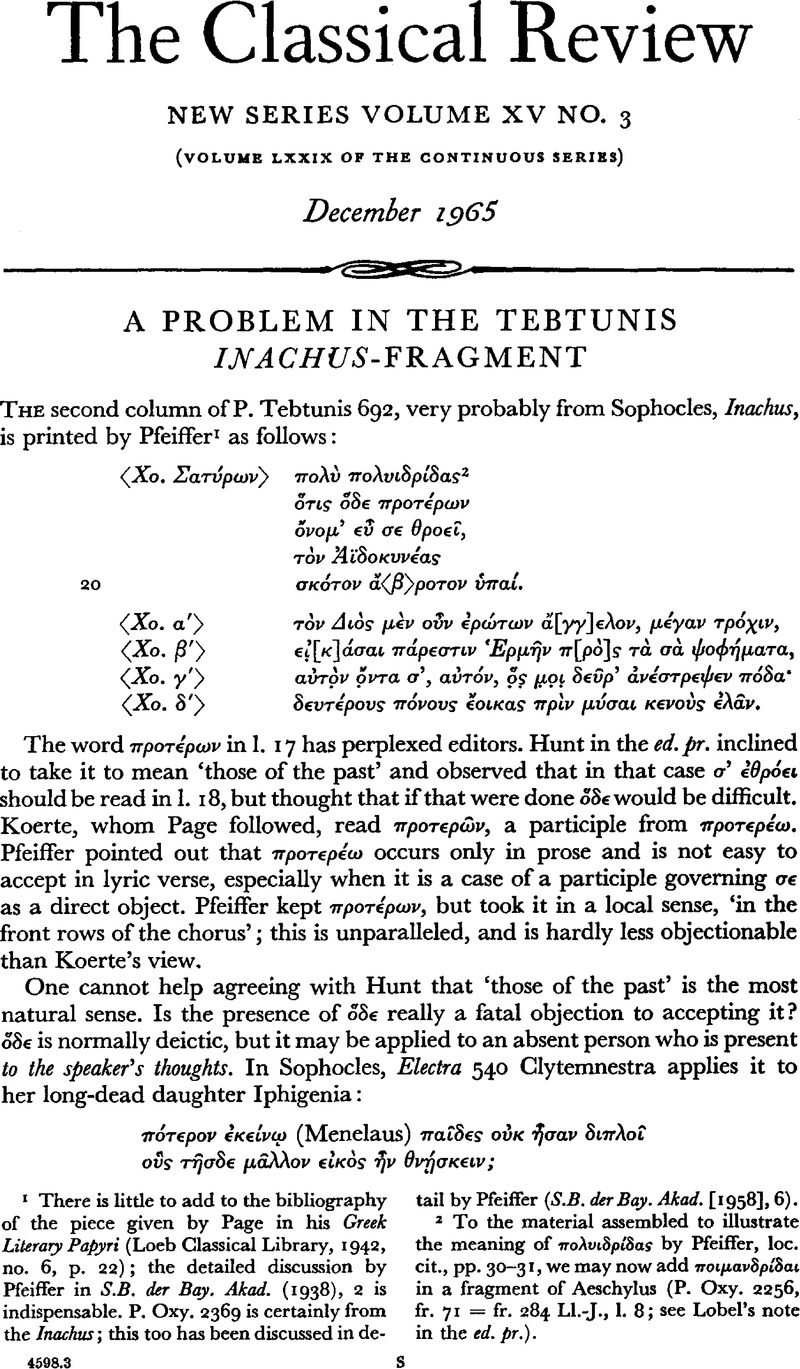Article contents
A Problem in the Tebtunis Inachus-Fragment
Published online by Cambridge University Press: 27 February 2009
Abstract

Information
- Type
- Review Article
- Information
- Copyright
- Copyright © The Classical Association 1965
References
page 241 note 1 There is little to add to the bibliography of the piece given by Page in his Greek Literary Papyri (Loeb Classical Library, 1942, no. 6, p. 22); the detailed discussion by Pfeiffer in S.B. der Bay. Akad. (1938), 2 is indispensable. P. Oxy. 2369 is certainly from the Inachus; this too has been discussed in detail by Pfeiffer (S.B. der Bay. Akad. [1958], 6).
page 241 note 2 To the material assembled to illustrate the meaning of πολυιδρίας by Pfeiffer, cit., pp. 30–31, we may now add ποιμανδρίδαι in a fragment of Aeschylus (P. Oxy. 2256, fr. 71 = fr. 284 Ll.-J., 1. 8; see Lobel's note in the ed. pr.).
page 242 note 1 Fraenkel and Denniston-Page prefer Tr's ὠνόμαζεν to F's ὠνόμαξεν, taking it an instance of the special use of ὀνομάζεινin the imperfect (Fraenkel ii. 329). Barrett on Euripides, Hipp. 32–33 (p. 162) warns us that this special use depends on two dubious instances; but if ἐ is right here, the judgement of the recent editors of the Agamemnon acquires fresh support.
page 242 note 2 See J. Lamer, R.-E. xi. 2519 f. and J. Roeger, ᾌϊδος κυνέη, Diss. Graz (1924) (reviewed by Kretschmer in Glotta xv. 175).
page 242 note 3 For the literature of the subject, see Frisk, Griechisches Etymologisches Wörterbuch, p. 34; the reference to Nilsson should now read ‘2nd edn., 455, with notes 4 and 5’. Cf. Felix Solmsen, Uniersuchungen zur griechischen Lautlehre, 71 f.
page 242 note 4 See Dodds on Gorgias 493 b 4.
page 242 note 5 At Aeschylus, P.V. 152 the words of the chorus τὰ πρὶν δὲ πελὼρια νῦν ἀϊστοῖ prompt Prometheus to wish that Zeus had hidden him in Tartarus, lower even than Hades, instead of exposing him to derision in the upper air: εἰ γάρ μ᾽ ὑπὸ γῆν νέρθεν τ᾽ Ἀῑδου τοῦ νεκροδέγμονος εἰς ἀπέραντον Τάρταον ἧκεν, κτλ. Did the word ἀϊστοῖ, by reason of this etymology, suggest the idea of Hades? Compare Agam. 462 f.:
κελαιναὶ δ᾽ Ἐρίνυες χρόνῳ
τυχηρὸnu; ὄντ᾽ ἄνευ δίκας
τιθεῖσ᾽ ἀμαυρόν, ἐν δ᾽ ἀῑστοις τελέθοντος οὔτις ἀλκά.
- 3
- Cited by

